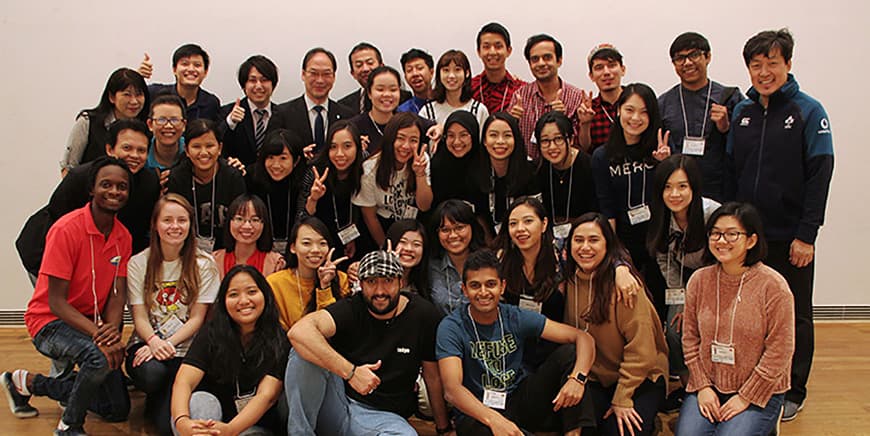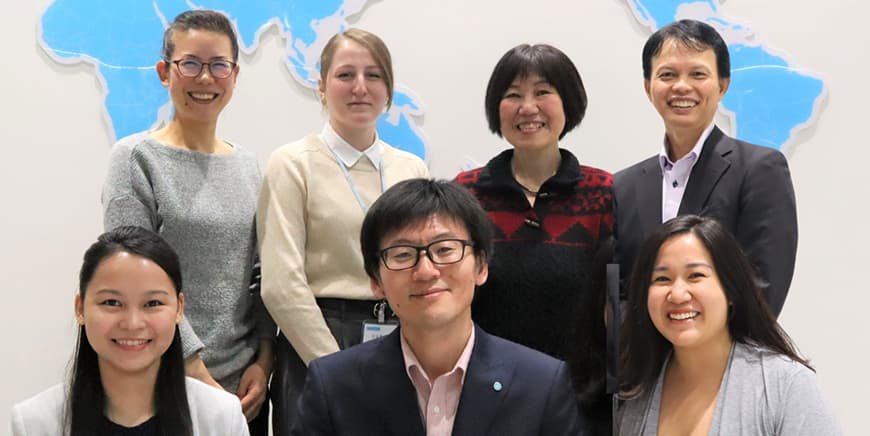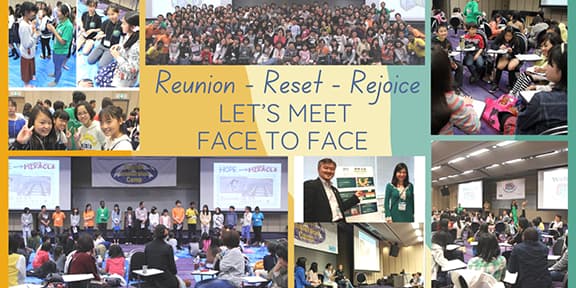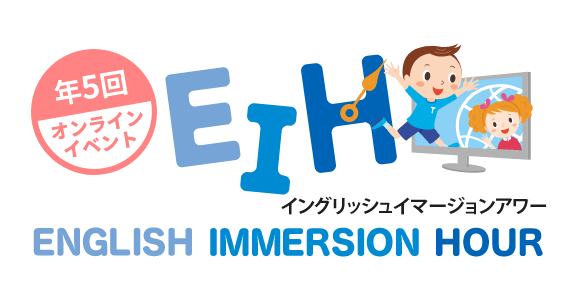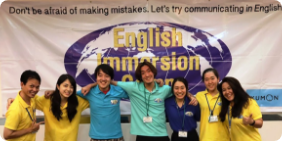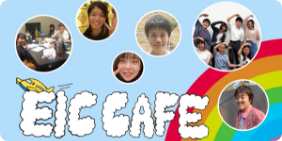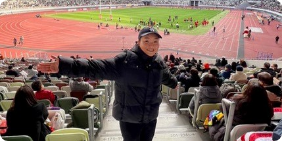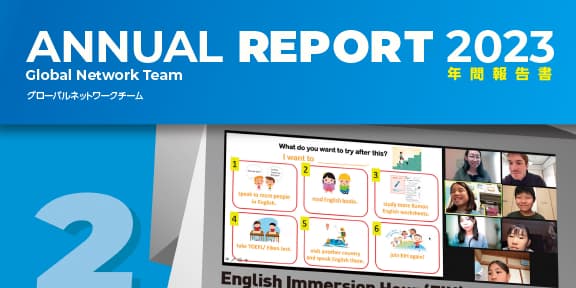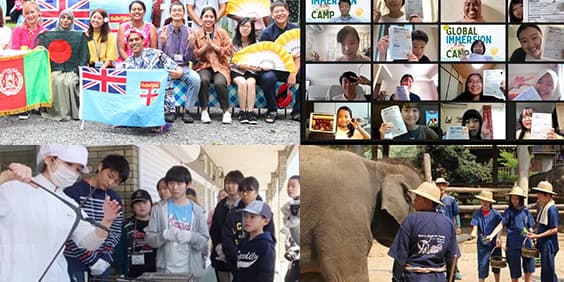Report
9th Ambassador of Peace Network (APN) Report
The 9th Ambassadors of Peace Network was successfully completed with 170 participants from 19 different countries and regions. These include past English Immersion Camp (EIC) participants, their family members, past Camp Leaders, Camp Staff, and guests who gathered at the Kumon Hall in Shin Osaka on Sunday, 23rd April 2017. The aims of this years APN were:
- To nurture global leaders and citizens for the next generation, who will be able to contribute to society by being aware of the issues affecting the world. To learn about the challenges faced when trying to deal with these issues and then, together, thinking about ways to solve these issues.
- To strengthen the EIC family network by connecting and interacting with other participants from different EIC years.
- To share the progress and growth of EIC participants through presentations of how they are striving to achieve their dreams and goals.
- To share information about other activities and programs organized by Kumon that participants can participate in after EIC.
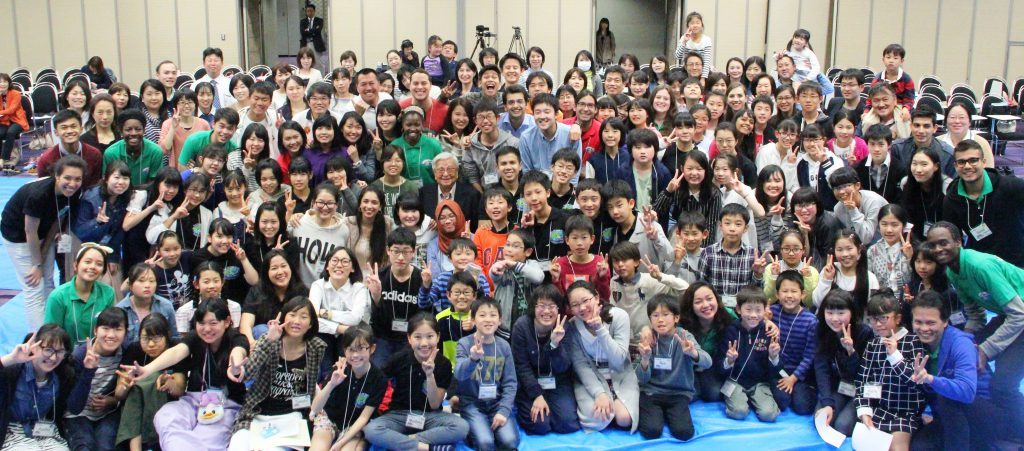
Under the theme of “EDUCATION” several activities were designed and included in the program. Please take a look at the program details below:
1. Group Time Activity: “Adventure to School”
According to UNESCO as of 2016, 263 million children and adolescents did not have access to school (UNESCO, 2016). As global citizens in this activity participants were divided into small groups and competed in a board game which helped them learn the facts about the different reasons why many children around the world do not get regular access to education. The symbols in the board game had different commands. For example some commands required participants to pick a fact sheet from a deck (below) and read it aloud to their group members. There were several decks which represented the different reasons why many children do not have access to education and these reasons include; child labor, gender inequality, geographical difficulty, health & nutrition, improvement, poverty, and war.
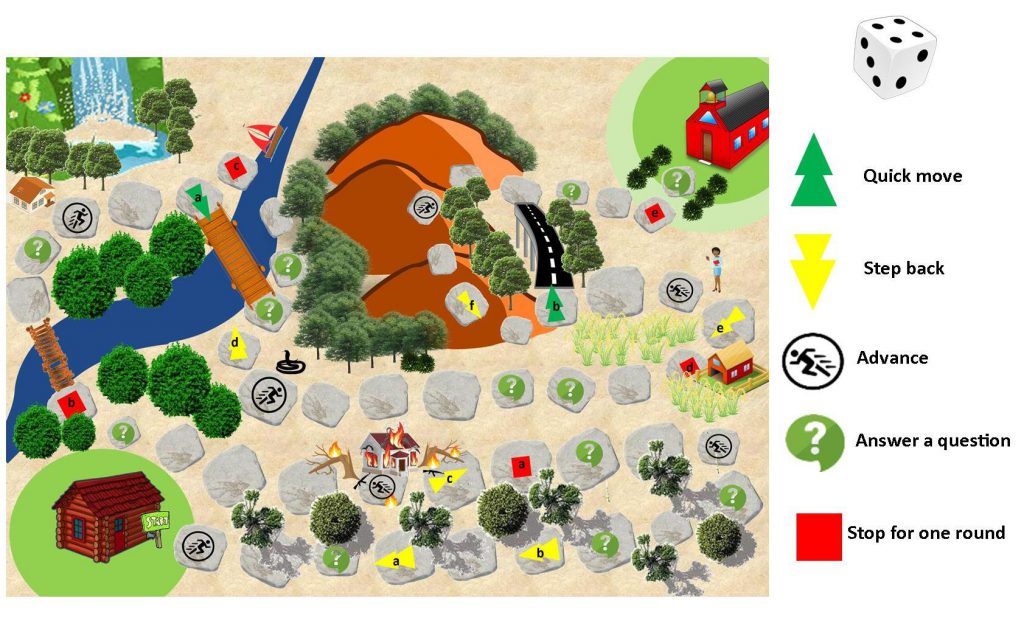
Click here for more information on the commands
Here is some of the information that was printed on fact sheets:
Child labor
① In 2014, as many as 98 million boys and girls aged 5-17 years were working in agriculture, such as in farming or fishing. ② Nearly 60 percent of child labor takes place in agriculture.
Gender inequality
① Girls often experience discrimination in education. They are made to stay at home to look after siblings or do housework. ② The illiteracy rate is highest among females. In more than 20 developing countries, illiteracy rates among women are over 70%.
War
① Many children are among those people killed because of war. Boys and girls are forced to join armed groups and separated from their families. ② In 2015, there were 1 billion children worldwide who lived in conflict areas. 300 million were under the age of five.

Comments from participants about the activity
“During the Group Time when we played the game “Adventure to School” I could learn about why some children have no access to education, and what are the contributing factors to this problem in a fun and interesting way.”
” I learned that many children cannot go to school and this was my favorite activity.”
2. Individual presentations from past EIC participants
Under the theme “My Life after EIC” three past participants presented about their dreams and goals and how they have been working hard to achieve them.
Ayaha Tomii EIC 2012, High School 1st Grader:“My KUMON”
“Studying at Kumon for 10 years and finishing the Japanese and English program up to final level helped her pass the entrance examination of junior high school. She enjoyed learning every day and wanted to learn many new things. Her favorite English study material was “Matilda” (Kumon English M Level). This story inspired her a lot because even though Matilda’s parents did not recognize her skills she did not give up but continued to go to the library and read books. She advises younger students to finish one subject before they become junior high school students because from her experience she became very busy after becoming a high school student.”
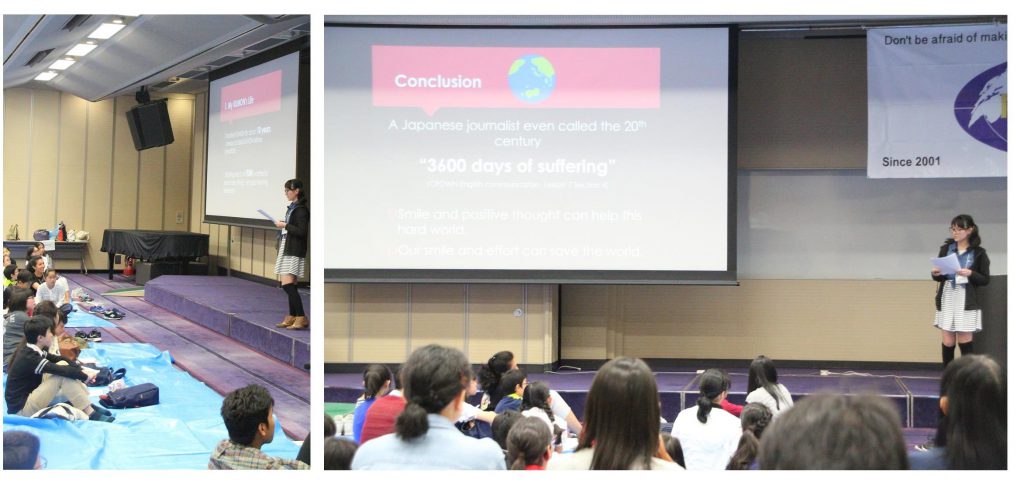
Please watch the video of her presentation
Iori Tsuda EIC 2011, High School 3rd Grade: “My Life in Switzerland”
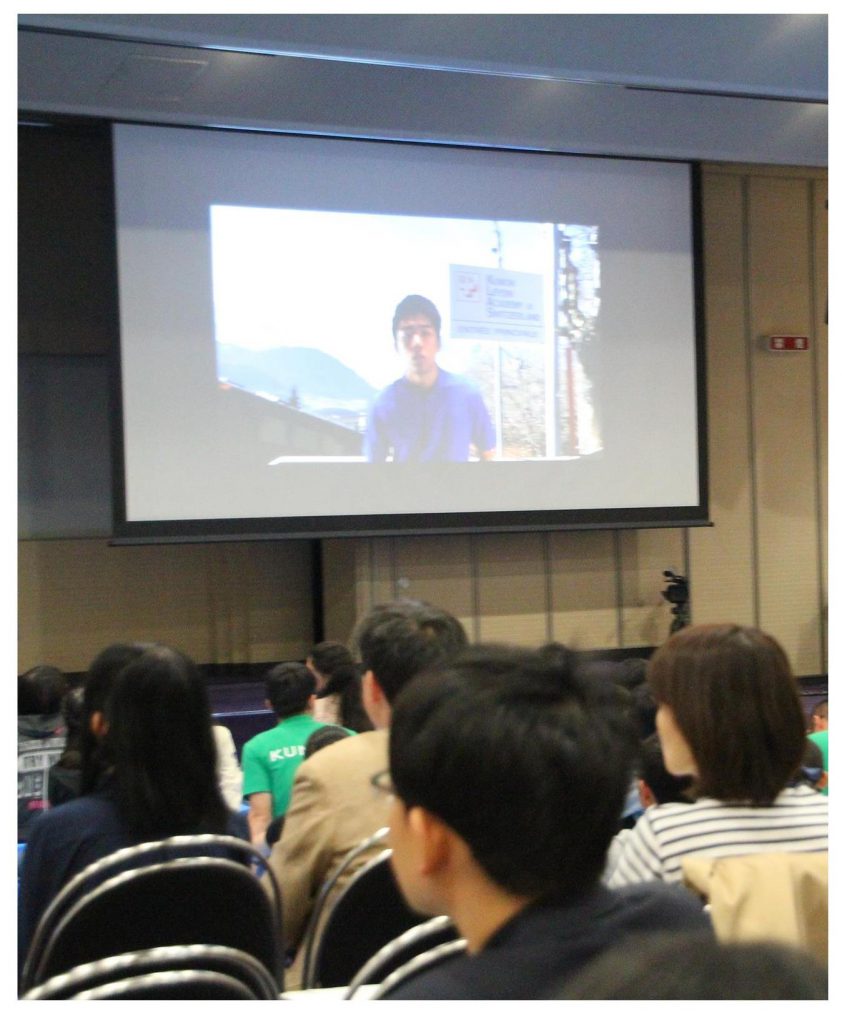
“After EIC, Iori went on to challenge himself and is now currently studying at Kumon Leysin Academy of Switzerland. He is currently taking Japanese courses, English courses and French courses at the same time. Though he seems to be having a great time in Switzerland this would have not been possible if he had not continued to study English. He advises younger students to continue to study English more and more in order to improve their English skills. He is currently studying Kumon English S level (research course) which he feels is quite useful for learning advanced English. He also had an opportunity to go for a homestay in Toronto, Canada where he was able to improve his English skills, learn about a different culture, and also appreciate the special characteristics of Japan. Through these experiences he learned the importance of learning languages.” Since he could not participate directly he sent a video of his presentation.
Please watch the video of his presentation
Nanami Saito EIC 2012, High School 1st Grade: “My life after EIC”
“After taking the challenge of EIC, Nanami also joined the Kumon English Camp for Youth (KECY) organized by Kumon for junior and high school students. Through KECY she became more interested in English and cross-cultural understanding, so she decided she wanted to go to a high school that focuses on both of them. In her presentation she talked about her experiences in high school. She mentioned that there are a lot of special classes. For example, cross-cultural understanding class, spoken English class and English debate class. In these classes students talk about their feelings, do presentations and debate all in English. These classes are very challenging for her since there is a lot of homework that requires her to think and write in English.
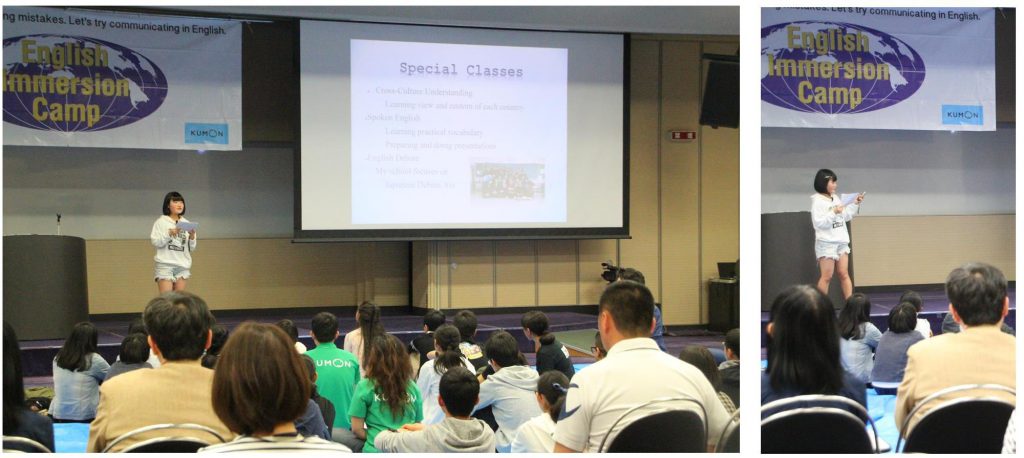
Through these experiences her English skills improved tremendously. She further talked about her classmates, both Japanese and foreigners, who live in Japan as unique individuals who have interests and are good at sports, foreign languages, fashion and may other things. Her school also offers exchange programs for current students and also for overseas students. These experiences have inspired her to take on new challenges regarding whatever she is interested in. Out of regular classes Nanami belongs to the International Action Club, which focuses mainly on volunteer and cross cultural communication. Through the valuable experience she got in EIC and KECY Nanami’s daily life and perspective changed. She advises her fellow EIC participants that if they want to change their perspectives and daily lives, they should pursue whatever they are interested in.
Please watch the video of her presentation
Comments from participants about the presentations
“I felt that it was amazing to see someone younger than me presenting in front of every one so confidently.”
“It was nice to know the importance of Kumon English.”
“They challenged themselves to do different things and I felt encouraged to also try my best.”
“I listened to many presentations and I realized I want to speak English more.”
“It was a good experience for me to hear the stories of people who had achieved the same goals that what I want to achieve.”
“Someday I also want to be like them. Today I realized one of my goals.”
3. Network Time: “Human Islands”
All the participants, regardless of age or EIC participation year, were able to interact with each other through this activity. Everyone was asked to stand up and the people in Kumon Hall were divided into two groups (A and B). The MC asked several ice breaking questions and if you answered YES you move to the A side, and if you answered B, you moved to the B side. Then, several questions followed where participants were asked to form small groups after each question and interact on a given topic for a specified time.
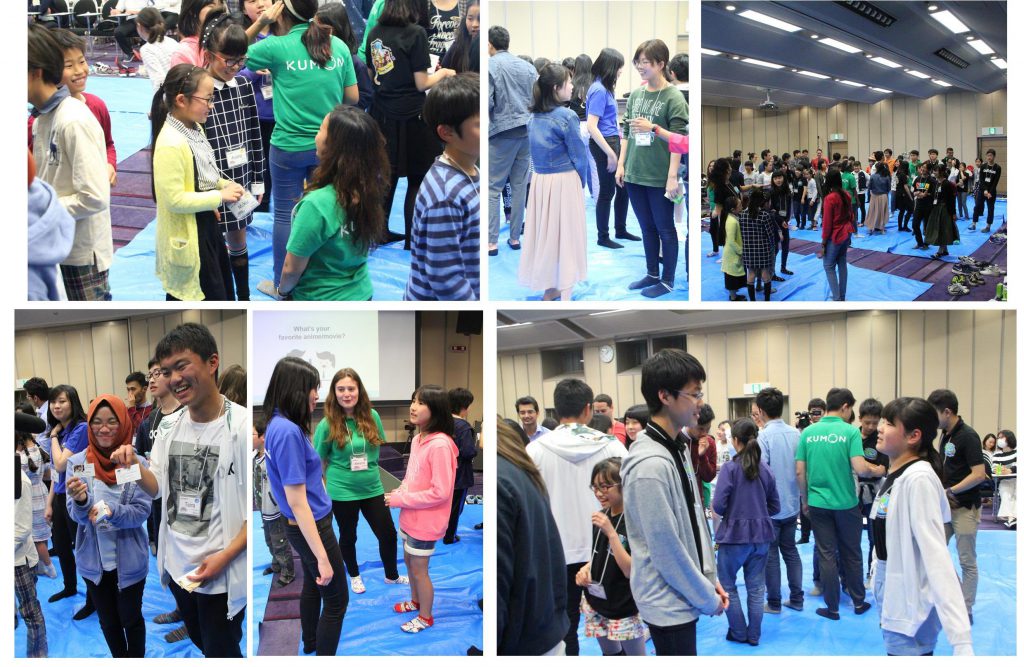
4. Mission: “Build a school” and Send All Your Kids to School
This activity was a follow-up to the“Adventure to School”activity. After learning the facts about the different reasons why many children around the world do not get regular access to education, participants were next given another challenge where they played the roles of villagers from four villages in an interactive game where the mission was to build a school in one of the four designated locations.
Information
Demographic location: Shows the location of the villages and the four different locations where the school can be built.
それぞれの村の特徴が書かれている
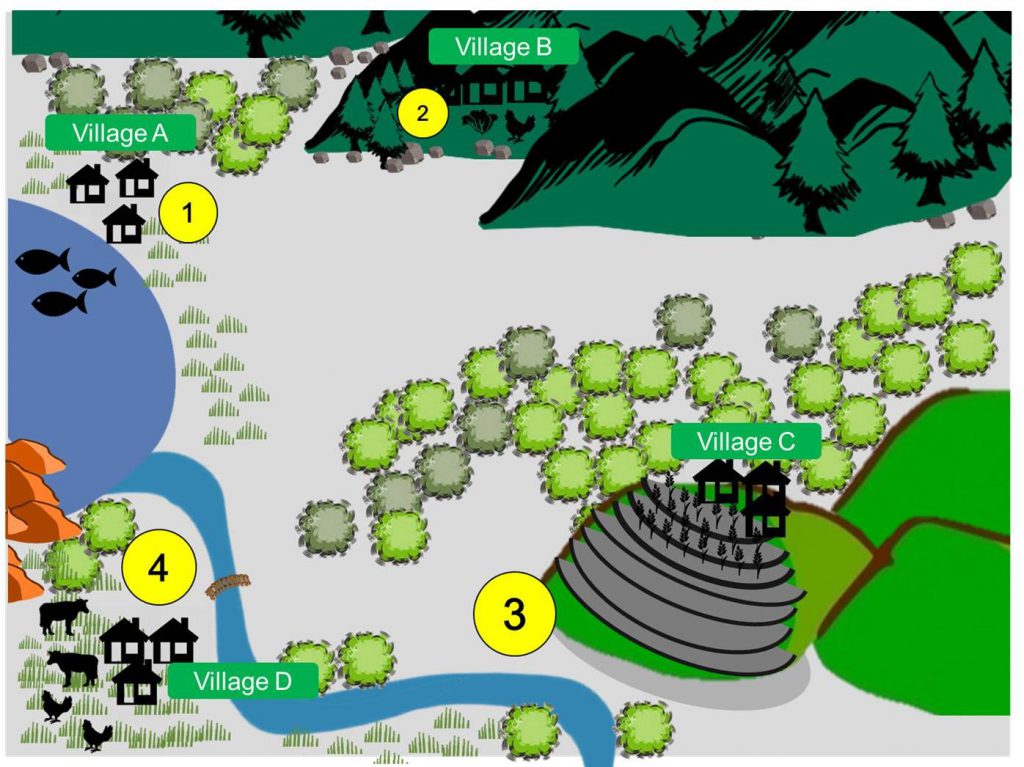
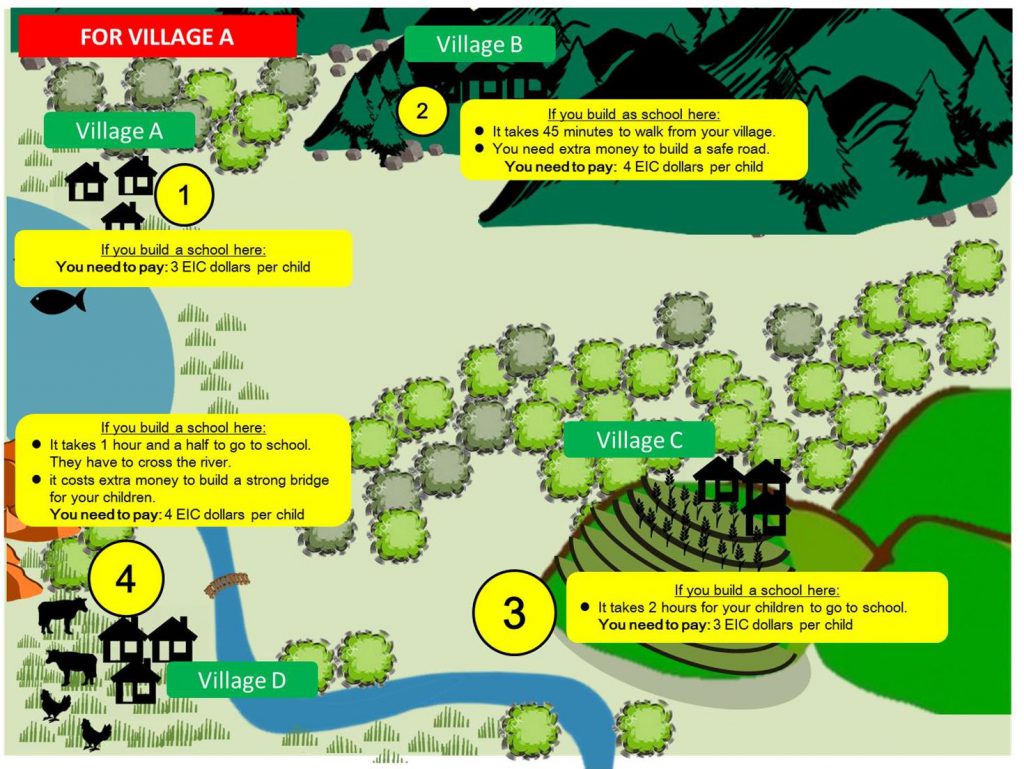
Click here for Village B, Village C, and Village D information.
Stage 1
- Each household shares their housing conditions.
- Three households gather together, and share the conditions of their own village.
- Each Village decides a place they wish to build their school.
- Decide three representatives who will attend “Meeting 1”
Meeting 1
→Each village introduces the place they chose for a new school, and the reason.
** After “Meeting 1”, each village collects the information sheets of all villages and return to their Village.
Stage 2
- In each village, they share the information from other villages with their own village members.
- Then they discuss again and choose a place they want to build a new school.
- Choose three representatives who will attend “Meeting 2”
Meeting 2
→Each village introduces the place they chose for a new school and the reason. (They can change their recommended place or maintain the same place they shared in stage 1). Then they share their opinions with the representatives from each village. But they do not make the final decision in “Meeting 2”
**After “Meeting 2” they go back to their own villages and make the final decision.
Stage 3
- In each village, they share the information from other villages with their own village members.
- Then they discuss again and choose the final place they want to build a new school.
- Choose three representatives who will attend “Meeting 3”
Meeting 3
→ Each village introduces the final place they chose to build the new school, and the reason. If all villages did not manage to choose the same place, then there is an open discussion. At this stage they have to convince each other to choose the best place to build the school.

After the whole activity participants returned to their respective groups and had a brief reflection time where they shared their feelings about whether they were able to decide the location of the school and what challenges or difficulties they faced when making the decision.
While interacting with each other, participants had the opportunity to discuss solutions to each village’s problems that prevent children from regular access to school. The game helped participants build up their critical thinking skills about this global issue while, at the same time, get to know the problems faced when trying to solve different global issues.
Comments from participants about the presentations
“Today I learned many things and about many problems in the world. In Mission: “Build a School” I could speak about my ideas in the meeting.”
“It was difficult because we had to make judgments while considering various things. I was able to explain my ideas in English.”
“Through discussions, I felt that I could understand the importance of cooperating with each other.”
“I felt the importance of engaging with each other. I want to do activities that can help children who cannot go to school.”
“I learned how important it is to take other’s opinion into consideration.”
“I can attend school easily and without any problem but today I learned it’s not so easy to build a school in some parts of the world. The activity was difficult but it was really fun.”
“We learned that many children can’t go to school because they must help their family.”
==========================================================================
5. Closing Speech: Kotaro Oishi, High School 2nd Grade “After Kumon English”
After participating in EIC Kotaro, joined a private combined junior and senior high school, in such schools you are required to study very hard and this was a challenge to him. In order to improve in his favorite subject of English, he set the goal of taking the Eiken exam once a year. Through this he was able to improve his reading, listening and speaking skills. Although he studied very hard he also belonged to the Japanese archery club. In the third grade he went to study abroad in Canada for three weeks. He recalls it as being the hardest time in his life. He could not talk with the other students because of his poor English, and even though he tried to make friends with many students it was very difficult for him. This made him realize that he needed to study English harder and harder. So, he set a goal and decided to take the Eiken Pre-1 exam. It wasn’t easy but he managed to reach his goal.
He further went on to talk about his life in Australia (where he also went for study abroad after Canada). His favorite subject was physical education. Even though the class was hard he could make friends through sports. As compared to Japanese high school most of the tasks and tests are essay-based. He also had to give presentations in front of the class which was really challenging and tough for international students. But, as a result of this, he was able to improve his communication skills using English. Life in Australia was not easy it required a lot of hard work but he enjoyed it because he had some hobbies. For example, he went to practice table tennis every Saturday. His other hobby is horse racing and he managed to attend the Melbourne Cup, which was an interesting experience for him.
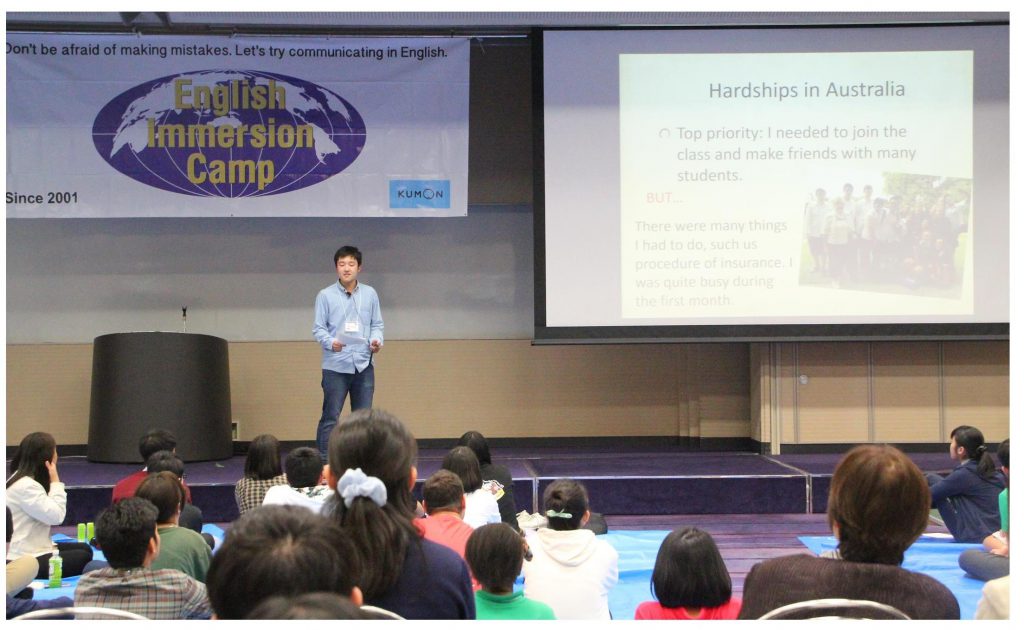
Lastly, he talked about his life after studying abroad. After entering Japanese high school he noticed that his mathematics skills had become poor while his English skills had improved a lot. His challenge now became how to keep on improving his English even after coming back from studying abroad. So, he set another even bigger goal for himself this time. He decided to take the TOEFL iBT exam, one of the most difficult English tests used as a criterion for university students that would like to study abroad. He achieved a score of 73, which he thought was not bad. But he is still not satisfied and will continue to take the exam over and over again. He also took the Eiken grade 1 (the final test of Eiken) exam and, after two months of practice, managed to pass it. It was like a dream come true for him because he thought it would take a longer time for him to pass it. He mentions that the trick to passing Eiken 1 is to practice a lot of reading, speaking, writing, and listening in English.
Firstly, his message to all participants is first to try whatever you can. Even though something looks very difficult or tough, most of the time it’s not as hard as it looks. So you should just go ahead and try anything that you are interested in. Secondly, you need to make an effort for your dream. Sometimes it might feel as if it’s hard. That was the same with Kotaro. Even though he continues to study for the TOEFL iBT exam, he sometimes feels like it’s impossible to get a good score. But he still believes he can do it. If you feel it is too hard for you to study English or other subjects, you have EIC family to help and support you. With some good advice your dream will come true. Thirdly, the most important thing when studying English is to study every day. It doesn’t mean you must do a lot of work each day but you should study the language little by little. Finally, never give up. It will take a long time to make your dream come true, but never give up. It may look very hard but it’s also the best way to achieve your dream.
Please watch the video of his presentation
Comments from participants about the presentation
“I learned the importance of doing something and the importance of not giving up.”
“I was inspired by the personal growth of other people. I also felt I wanted to be like them one day.”
“I was surprised that he had made so much effort. I was inspired by him.”
“We could imagine our own future. I am proud of him.”
Overall impressions
“APN was very fun, because the programs were very interesting. The most interesting one was Mission: Build a school. It was very good for me. It was very difficult for me but I learned about people who want to go to school. I can go to school very easily, but they can’t go to school very easily. It is a very bad thing.”
“First, I am so happy to see EIC family members and camp leaders. I love EIC members. The most interesting activity was Mission: “Build a school.” I could hear brilliant ideas which I couldn’t come up with, for example sharing money which sounds easy, but I think it’s difficult. If people all over the world had such an opinion, most international issues would disappear. I was encouraged by the EIC family and I will do my best and never give up learning English. Thank you for holding APN.”
“I just started studying French and my dream is to get a job which uses English and French and has relations with foreign people. I am a freshman and I will take on more and more challenges in university. Today’s activities made me more positive regarding my dream. I’ll try hard in everything just like the EIC family.”
“Today was very fun. I learned many things. For example, there are poor people and rich people and children that can’t go to school. I’m a very happy person, because I can go to school. I can eat enough food and Japan is a peaceful country. I want the peace to continue. I want to join APN again.”
=========================================================================
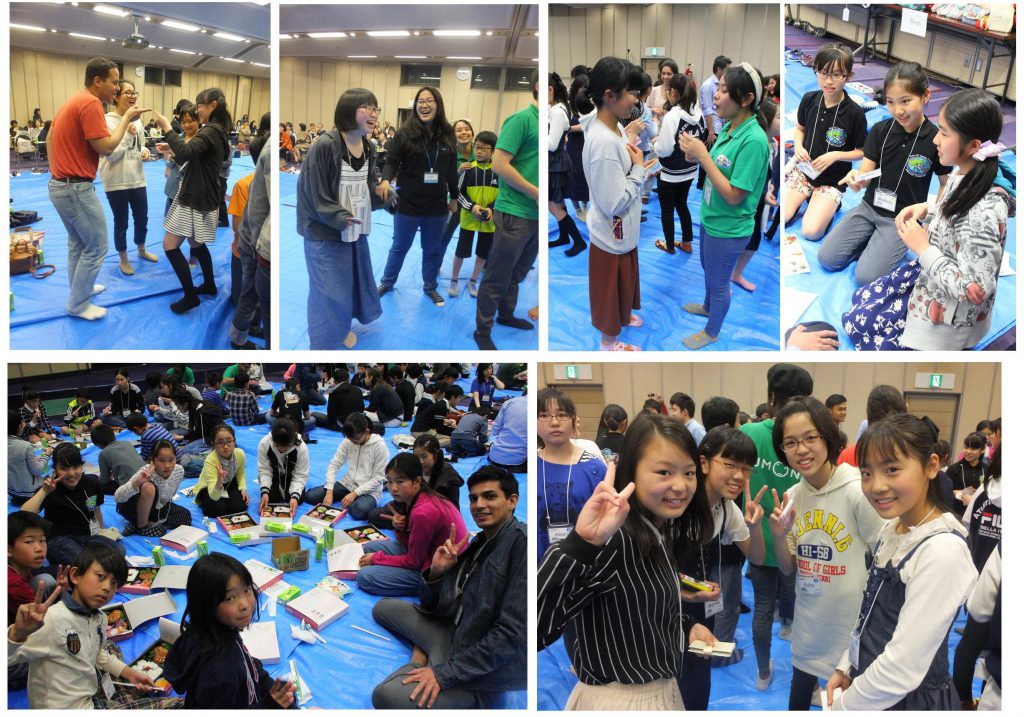
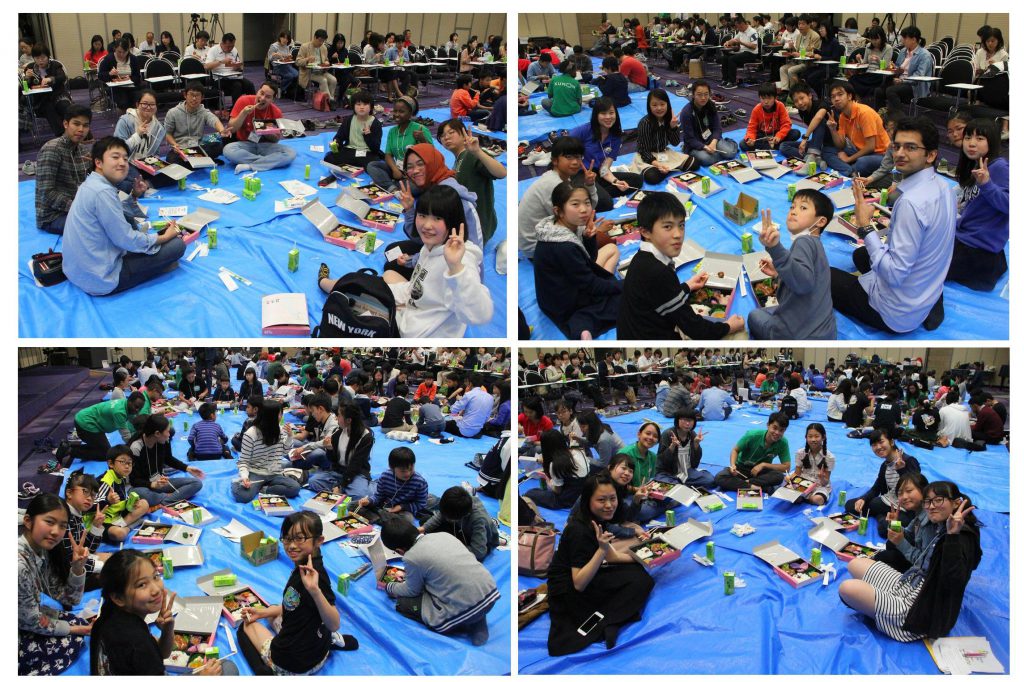
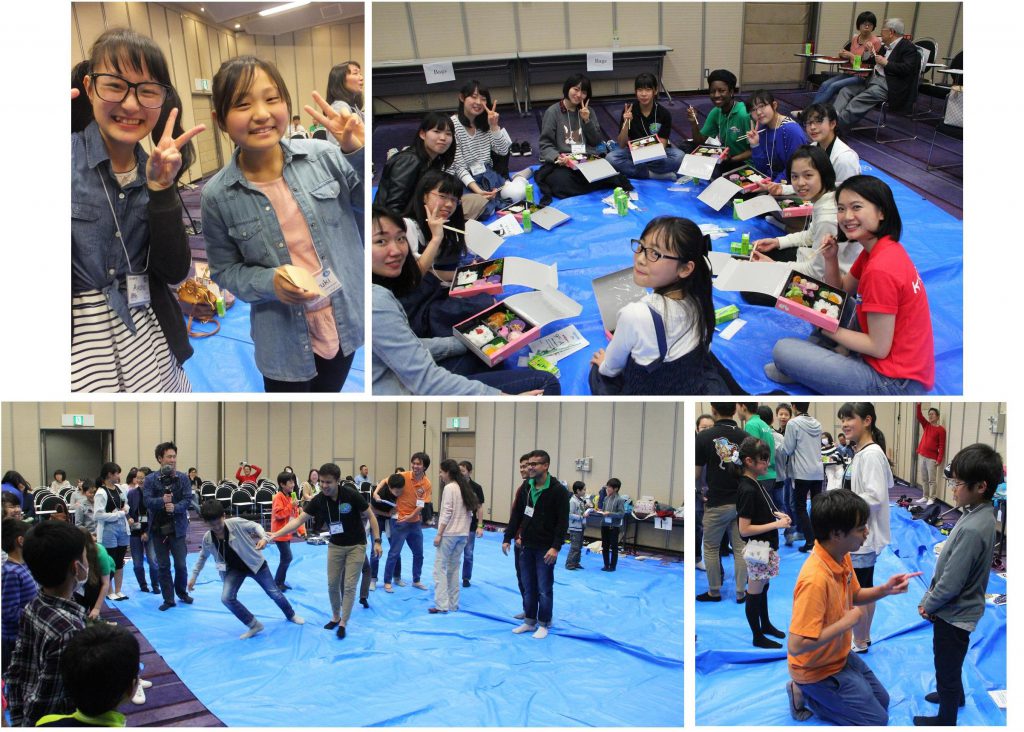
If you like this article, click the heart button!
Previous reports
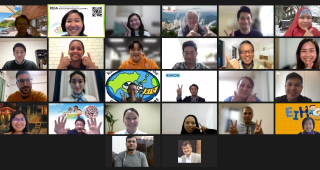
4th Global Network Initiatives (GNI) Report
The 4th Global Network Initiatives (GNI) was another delightful event held on Saturday 21st Fe...
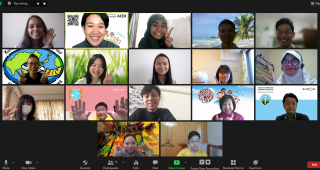
3rd Global Network Initiatives (GNI) Report
Our 3rd Global Network Initiatives (GNI) Online Event was successfully carried out on Sunday, ...
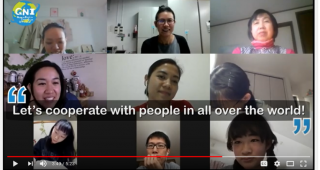
2nd Global Network Initiatives (GNI) Report
Please have a look at the below Digest Video to hear what we talked about in GNI SOS...



